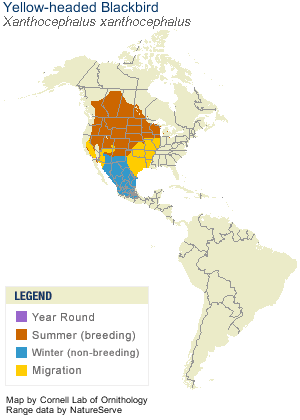Xanthocephalus xanthocephalus or Yellow-headed Blackbird or as Pete Dunne calls it 'Saffron-hooded Cacophony'. Sums it up.
Nothing is more entertaining than watching a male YHBL puff out his chest, spread the tail feathers, hunch out his wings, throw back his head and let loose with....a sound almost exactly like a very rusty old gate opening for the first time in years.
These boys are unmistakable and very common out here in the western side of the continent. Years ago, I was birding at Delta Marsh at the bottom end of Lake Manitoba. The south end of the lake is bordered by a small collection of deciduous trees and a vast wetland full of reeds, cattails and phragmites. I was jubilant having just seen my first Blackburnian Warbler. I met a young couple on the marsh boardwalk who were acting equally as jubilant. We shared our exciting news. They were from Ontario and had just seen their first Yellow-headed Blackbird. Yay (Blackburnian Warblers nest in their yard).

I grew up with the birds and frogs of prairie sloughs making joyful racket. When I want to clear my thoughts, exorcise my worries, achieve my particular state of zen, I wander off to the nearest cattail marsh.
Yellow-headed Blackbirds are among the first birds to return in Spring, staking out their territory in the marshes. A late season snow will bring the blackbirds into town to scrounge at the seed feeders.
The female of this species is a mostly brown bird, with some yellow on the brow, face and upper breast, some white streaks on lower breast. Immatures are similar. The females build nests on the emergent vegetation, the nest is always placed over deep water.
Unfortunately, I haven't got a decent photo of a girl YHBL to post so here is another one of buddy, throwing his head back in mid-sqwak.
Apparently there have almost always been Yellow-headed Blackbirds. Cool Fact from All About Birds:
Range Map from All About Birds
Information Sources:
Pete's Dunne's Essential Field Guide Companion
All About Birds
Nothing is more entertaining than watching a male YHBL puff out his chest, spread the tail feathers, hunch out his wings, throw back his head and let loose with....a sound almost exactly like a very rusty old gate opening for the first time in years.
These boys are unmistakable and very common out here in the western side of the continent. Years ago, I was birding at Delta Marsh at the bottom end of Lake Manitoba. The south end of the lake is bordered by a small collection of deciduous trees and a vast wetland full of reeds, cattails and phragmites. I was jubilant having just seen my first Blackburnian Warbler. I met a young couple on the marsh boardwalk who were acting equally as jubilant. We shared our exciting news. They were from Ontario and had just seen their first Yellow-headed Blackbird. Yay (Blackburnian Warblers nest in their yard).

I grew up with the birds and frogs of prairie sloughs making joyful racket. When I want to clear my thoughts, exorcise my worries, achieve my particular state of zen, I wander off to the nearest cattail marsh.
Yellow-headed Blackbirds are among the first birds to return in Spring, staking out their territory in the marshes. A late season snow will bring the blackbirds into town to scrounge at the seed feeders.
The female of this species is a mostly brown bird, with some yellow on the brow, face and upper breast, some white streaks on lower breast. Immatures are similar. The females build nests on the emergent vegetation, the nest is always placed over deep water.
Unfortunately, I haven't got a decent photo of a girl YHBL to post so here is another one of buddy, throwing his head back in mid-sqwak.
Apparently there have almost always been Yellow-headed Blackbirds. Cool Fact from All About Birds:
Pleistocene fossils of Yellow-headed Blackbirds (from 100,000 years ago) have been dug up in California, New Mexico, and Utah.
Range Map from All About Birds
Information Sources:
Pete's Dunne's Essential Field Guide Companion
All About Birds





Quite the scientific name it has! Great photos!
ReplyDeleteThanks, Josiah. Ha, Xan-xan for short.
DeleteIndeed they are a gorgeous bird. Very rare here in the southeastern part of Minnesota though I have seen a few in the southwester corner....:)
ReplyDeleteFar too lush and moist down where you are, I guess. Thanks for stopping into the blog, TB.
Delete